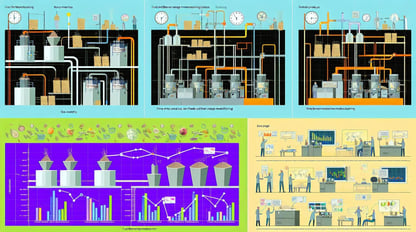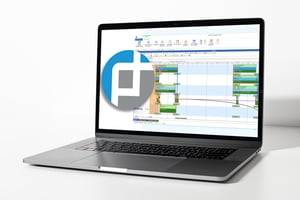Time Series Analysis for Advanced Forecasting and Scheduling
The efficient utilization of resources and accurate forecasting play pivotal roles in driving operational excellence in food and beverage manufacturing. As a Plant Manager, you understand the challenges inherent in maintaining optimal production schedules while managing fluctuating demands and limited resources. In recent years, the integration of advanced technologies such as time series analysis into scheduling processes has emerged as a game-changer, revolutionizing the way manufacturing facilities operate.
In this blog, we look into the significance of time series analysis for forecasting in scheduling within food and beverage manufacturing facilities. Moreover, we'll explore how integration between leading scheduling software like PlanetTogether and prominent ERP, SCM, and MES systems such as SAP, Oracle, Microsoft, Kinaxis, and Aveva enhances efficiency and agility in production planning and scheduling.

Understanding Time Series Analysis
Time series analysis involves examining data points collected, recorded, or otherwise measured at successive, evenly spaced time intervals. In the context of manufacturing, time series analysis enables the identification of patterns, trends, and seasonality within historical production data, facilitating more accurate forecasting of future demands.
By leveraging sophisticated statistical techniques and algorithms, time series analysis empowers manufacturers to anticipate fluctuations in demand, adjust production schedules accordingly, and optimize resource allocation for enhanced efficiency and cost-effectiveness.

Importance of Forecasting in Scheduling
Accurate forecasting lies at the heart of effective scheduling in food and beverage manufacturing. By anticipating future demand patterns, plant managers can proactively adjust production schedules, minimize inventory holding costs, and ensure timely delivery of products to customers. However, traditional forecasting methods often fall short in capturing the complexities and dynamics of modern supply chains.
This is where time series analysis steps in, offering a data-driven approach to forecasting that accounts for seasonality, trends, and irregular variations in demand. By analyzing historical production data in conjunction with external factors such as market trends, consumer behavior, and economic indicators, manufacturers can generate more precise forecasts, enabling proactive decision-making and agile response to changing market conditions.

Integration with ERP, SCM, and MES Systems
In today's interconnected manufacturing landscape, seamless integration between scheduling software and enterprise-level systems is essential for maximizing operational efficiency and agility. Leading scheduling solutions like PlanetTogether offer robust integration capabilities with prominent ERP, SCM, and MES systems, including SAP, Oracle, Microsoft, Kinaxis, and Aveva.
By integrating scheduling software with these enterprise systems, plant managers gain real-time visibility into inventory levels, production capacities, and resource availability across the entire supply chain. This integration enables seamless data exchange between different systems, streamlining production planning, scheduling, and execution processes for improved efficiency and responsiveness.
Benefits of Integration
Enhanced Data Accuracy: Integration between scheduling software and ERP, SCM, and MES systems eliminates manual data entry errors and ensures the consistency and accuracy of production data across multiple platforms.
Real-Time Visibility: Plant managers gain real-time visibility into key performance metrics, production schedules, and inventory levels, enabling proactive decision-making and timely intervention to address potential bottlenecks or disruptions.
Improved Collaboration: Integration facilitates collaboration and communication between different departments within the organization, fostering alignment of production goals and priorities across the supply chain.
Agile Response to Change: By synchronizing data and processes between scheduling software and enterprise systems, manufacturers can quickly adapt to changing market conditions, customer preferences, or unforeseen disruptions, minimizing downtime and maximizing efficiency.
Time series analysis holds immense potential for revolutionizing forecasting and scheduling processes in food and beverage manufacturing facilities. By leveraging advanced statistical techniques and integration with leading ERP, SCM, and MES systems, plant managers can enhance operational efficiency, responsiveness, and agility, driving sustainable growth and competitive advantage in today's dynamic marketplace.
As a Plant Manager, embracing time series analysis and leveraging integration between scheduling software like PlanetTogether and enterprise systems such as SAP, Oracle, Microsoft, Kinaxis, and Aveva is not just a strategic imperative but a pathway to unlocking the full potential of your manufacturing operations in the digital age.
By harnessing the power of data-driven insights and advanced technologies, you can steer your facility towards greater productivity, profitability, and success in the ever-evolving landscape of food and beverage manufacturing.
Are you ready to take your manufacturing operations to the next level? Contact us today to learn more about how PlanetTogether can help you achieve your goals and drive success in your industry.